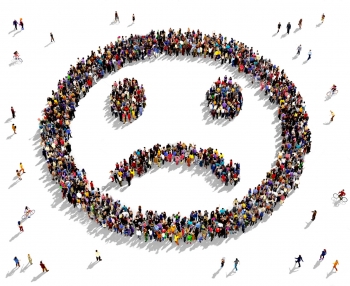Just over a year after the Covid-19 pandemic hit the country, what has happened to labor income inequality and prosperity since then? What about the subjective indicators of wellbeing such as happiness and everyday emotions? How does Brazil compare to the rest of the world?
The Top of Inequality - The pandemic adds another three hundredths to the labor based Gini Index bringing it to 0.674 in the first quarter of 2021*[1], our all-time series record (since 2012). The literature considers this movement a great leap in inequality. Before that Brazil had already the 8th highest overall income Gini among 159 countries.
Prosperity - In the January to March 2020 quarter, mean income reaches its highest point of the series at R$ 1122 and in less than a year it falls 11.3% reaching the lowest point of the historical series at R$ 995*, the first ever point beneath a thousand reais a month. 11.3% Drop
Social Welfare - We integrated the evolution of the mean with inequality as components to measure the nation’s overall social welfare. Labor welfare in 2020Q1 was at technical tie with the beginning of the historical series in 2012, in other words, there was no net social progress this decade. In the year following the pandemic wellbeing fell by 19.4%, a new low for the series*.
The Poor Lost More – Switching to mean individual income from work including informal workers and those without work, it fell 10.89% between the first quarters of 2020 and 2021. The income decline of the poorest half was 20.81%, almost twice as much as the overall mean.
Happiness is gone - Considering subjective measures of wellbeing, a result of people’s direct assessment about their lives. We start with an overall measure of happiness given by a rating of satisfaction with life on a scale from 0 to 10. Brazil experienced an average drop of 0.4 points in 2020, reaching 6.1 the lowest point in the historical series since 2006.
Inequality of Happiness - The fall in happiness occurs in the poorest 40% (-0.8%) and in the middle group (-0.2) situated between 40% and 60% of income. The wealthier groups, however, maintained their satisfaction with life. In other words, there is an increase in the inequality of happiness during the pandemic. The difference in life satisfaction between the income extremes was 7.9% in 2019 rising to 25.5%.
International Comparisons - The Covid-19 pandemic has markedly affected the daily lives of people around the globe. As an experiment we compared Brazil with 40 other countries surveyed covering a wide sample of nations from Austria, passing through China reaching Zimbabwe. Brazilians average life satisfaction grade fell from 6.5 in 2019 to 6.1 in 2020. In the rest of the world, the score was unchanged by the pandemic remaining at around 6.0. Essentially, there is a marked relative loss of happiness for Brazilians during the pandemic.
Everyday Emotions - There are also specific measures of wellbeing that ask for emotions felt in relevant quantities on the eve of the survey date. This refers to feelings of anger, worry, stress, sadness and fun. Feelings of anger in Brazilians rose from 19% in 2019 to 24% in 2020, a change of 5 percentage points. In the world, this advance was 0.8% percentage points. In other words, anger increased 4.2 percentage points more in Brazil during the pandemic than it did the rest of the world. Similarly: worry, stress and sadness rose by, respectively, 3.6, 2.9 and 2.2 percentage points more in Brazil than in the rest of the world. All subjective indicators of well-being considered worsened more in Brazil during the pandemic than the average of the other 40 countries.
Overall - The pandemic has worsened inequalities within Brazil and caused greater loss in wellbeing here than it did for other nations. Even in happiness Brazil is now more unequal.
All the research materials can be accessed on the FGV Social website.
| Contact: fgvsocial@fgv.br / +5521 3799-2320





